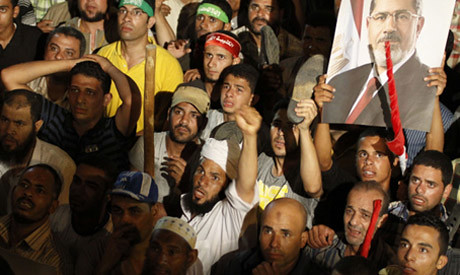
Crowds of supporters of ousted President Mohamed Morsi of Egypt. Morsi's followers and others say it was a coup that replaced him., a photo by Pan-African News Wire File Photos on Flickr.
Frequently Asked Questions about Egypt's Morsi trial
Zeinab El Gundy, Saturday 2 Nov 2013
Ahram Online answers questions about the laws and events behind ousted president Mohamed Morsi's trial, scheduled to begin on Monday
As the second president of Egypt to stand trial for the killing of protesters, there are important questions to be answered about the trial of Mohamed Morsi due to start on 4 November 2013.
What charges does Morsi face in this trial?
Morsi is charged with incitement to commit murder and violent acts during protests at the Ittihadiya presidential palace on 4 December 2012 during clashes between Morsi supporters and opponents. The clashes resulted in the murder of eight people, including at least four Muslim Brotherhood members, as well as journalist El-Hosseini Abul-Deif. Hundreds were also injured in the clashes, and there were reports of protesters being tortured.
What is the maximum penalty Morsi faces?
According to lawyer Mahmoud Ahmed of the pro-Morsi National Coalition to Support Legitimacy, the maximum penalty for the incitement of murder is the death penalty, or in some cases a life sentence in jail.
Who are the other defendants alongside Mohamed Morsi?
In addition to the deposed president, 14 other people will also stand trial, including: former deputy chairman of the Freedom and Justice Party Essam El-Erian, former deputy chief of staff of the presidential palace Asaad Shiha, former presidential office manager Ahmed Abdel-Ati, former presidential advisor Ayman Hodhod, leading Brotherhood figures Mohamed El-Beltagy and Alaa Hamza, Islamist media figure Abdel-Rahman Ezz, Islamist youth figure Ahmed Mogheer, Salafist leader Gamal Saber, and Islamist religious figure Wagdy Ghoneim.
What is the difference between Morsi’s trial and Hosni Mubarak’s trial concerning the killing of the protesters?
Mubarak stood trial because he did not protect or stop the killing of peaceful protesters in the early days of the January 25 Revolution. Morsi is charged with inciting his supporters from the Brotherhood to attack and kill opposing protesters. The defendants in Mubarak’s case included officials from his administration, mainly from the interior minister, including former interior minister Habib El-Adly. The defendants in Morsi’s trial include leading Brotherhood figures and Islamist supporters, aside from former officials in his administration team.
Will Morsi stand trial on other charges?
This is the first time the ousted president has been referred to the courts since he was removed from power on 3 July. He is still being investigated by the prosecutor's office on other charges, including espionage and the killing and abducting of soldiers and policemen.
Will Morsi appear in court on Monday?
It is unclear whether he will attend the first session of the trial. Some news reports say he might not be present for security reasons. A video conference may be used to avoid security concerns. However, according to lawyer Mamdouh Ahmed, Morsi is required by criminal law to attend the first session of the trial in person.
What about the defendants who have not been arrested?
In accordance with Egyptian criminal law, those defendants who do not appear in court will be tried in absentia.
Mohamed Morsi is said to not to recognise the court’s authority. How will this affect the trial?
According to established legal procedures, the judge will ask the defendant in the first session of the trial if he will be represented by a lawyer or if hewould likethe court to appoint him a lawyer. If he refuses to answer, the judge has the right to appoint a lawyer to represent the defendant.
What happened during the clashes in front of the presidential palace on 4 December 2012?
Clashes erupted between Morsi supporters and opponents over a constitutional declaration he issued in late November 2012, immunising his decisions from court appeal. During these clashes, pro-Morsi protesters attacked and violently dispersed an anti-Morsi sit-in in front of the Ittihadiya presidential palace on the morning of 4 December 2012. Throughout the afternoon and into the following morning, pro- and anti-Morsi protesters clashed, resulting in the death of eight people, including four members of the Brotherhood and four anti-Brotherhood protesters.
In addition, hundreds were injured, including a number of anti-Morsi protesters who were filmed being tortured at the gates of the presidential palace by Brotherhood members.During the clashes, Brotherhood leaders called for popular mobilisation to protect what they saw as an attack against the elected president.
http://english.ahram.org.eg/News/85409.aspx
No comments:
Post a Comment